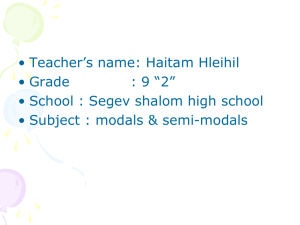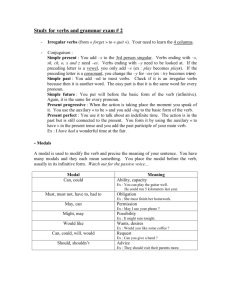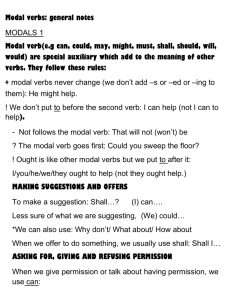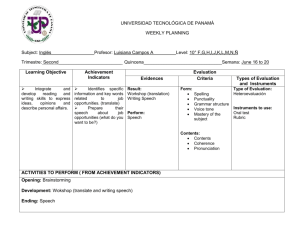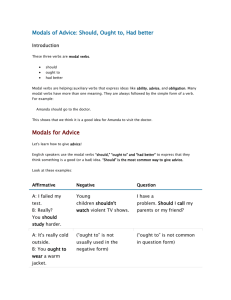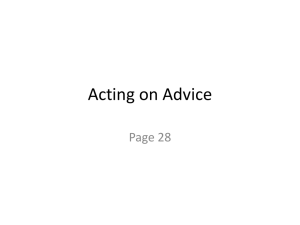ESLG 50 STUDY GUIDE for EXAM FOUR: MODALS
advertisement
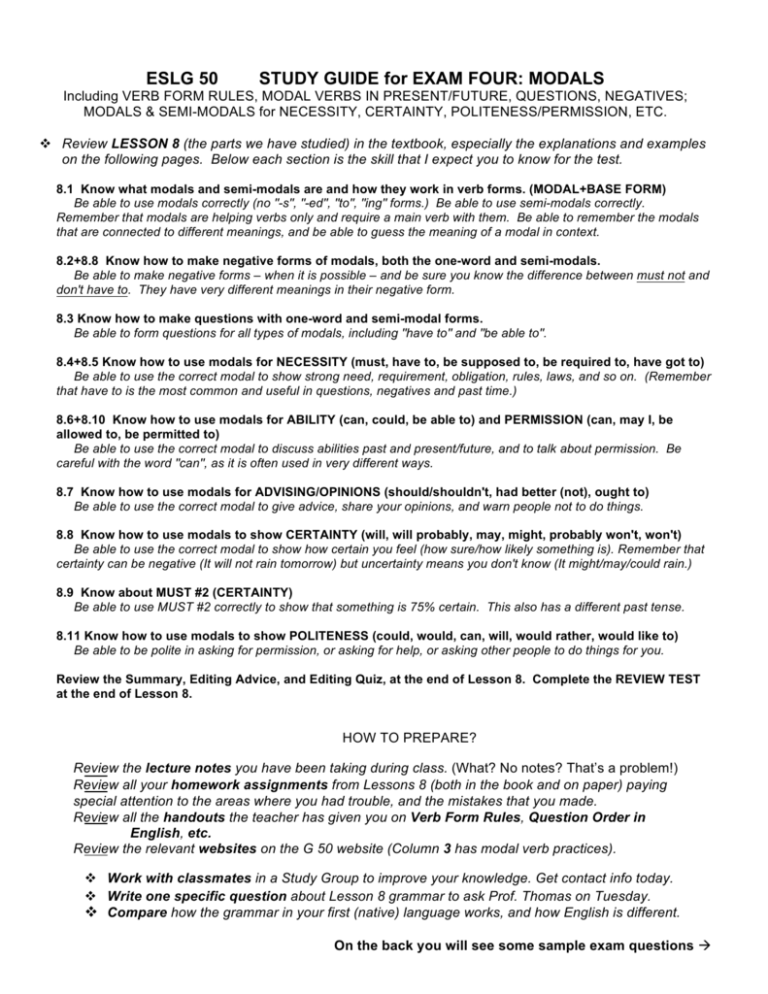
ESLG 50 STUDY GUIDE for EXAM FOUR: MODALS Including VERB FORM RULES, MODAL VERBS IN PRESENT/FUTURE, QUESTIONS, NEGATIVES; MODALS & SEMI-MODALS for NECESSITY, CERTAINTY, POLITENESS/PERMISSION, ETC. v Review LESSON 8 (the parts we have studied) in the textbook, especially the explanations and examples on the following pages. Below each section is the skill that I expect you to know for the test. 8.1 Know what modals and semi-modals are and how they work in verb forms. (MODAL+BASE FORM) Be able to use modals correctly (no "-s", "-ed", "to", "ing" forms.) Be able to use semi-modals correctly. Remember that modals are helping verbs only and require a main verb with them. Be able to remember the modals that are connected to different meanings, and be able to guess the meaning of a modal in context. 8.2+8.8 Know how to make negative forms of modals, both the one-word and semi-modals. Be able to make negative forms – when it is possible – and be sure you know the difference between must not and don't have to. They have very different meanings in their negative form. 8.3 Know how to make questions with one-word and semi-modal forms. Be able to form questions for all types of modals, including "have to" and "be able to". 8.4+8.5 Know how to use modals for NECESSITY (must, have to, be supposed to, be required to, have got to) Be able to use the correct modal to show strong need, requirement, obligation, rules, laws, and so on. (Remember that have to is the most common and useful in questions, negatives and past time.) 8.6+8.10 Know how to use modals for ABILITY (can, could, be able to) and PERMISSION (can, may I, be allowed to, be permitted to) Be able to use the correct modal to discuss abilities past and present/future, and to talk about permission. Be careful with the word "can", as it is often used in very different ways. 8.7 Know how to use modals for ADVISING/OPINIONS (should/shouldn't, had better (not), ought to) Be able to use the correct modal to give advice, share your opinions, and warn people not to do things. 8.8 Know how to use modals to show CERTAINTY (will, will probably, may, might, probably won't, won't) Be able to use the correct modal to show how certain you feel (how sure/how likely something is). Remember that certainty can be negative (It will not rain tomorrow) but uncertainty means you don't know (It might/may/could rain.) 8.9 Know about MUST #2 (CERTAINTY) Be able to use MUST #2 correctly to show that something is 75% certain. This also has a different past tense. 8.11 Know how to use modals to show POLITENESS (could, would, can, will, would rather, would like to) Be able to be polite in asking for permission, or asking for help, or asking other people to do things for you. Review the Summary, Editing Advice, and Editing Quiz, at the end of Lesson 8. Complete the REVIEW TEST at the end of Lesson 8. HOW TO PREPARE? Review the lecture notes you have been taking during class. (What? No notes? That’s a problem!) Review all your homework assignments from Lessons 8 (both in the book and on paper) paying special attention to the areas where you had trouble, and the mistakes that you made. Review all the handouts the teacher has given you on Verb Form Rules, Question Order in English, etc. Review the relevant websites on the G 50 website (Column 3 has modal verb practices). v Work with classmates in a Study Group to improve your knowledge. Get contact info today. v Write one specific question about Lesson 8 grammar to ask Prof. Thomas on Tuesday. v Compare how the grammar in your first (native) language works, and how English is different. On the back you will see some sample exam questions à SAMPLE EXAM QUESTIONS KNOW the five verb form rules. Know how to form present simple, present continuous and future simple by following these verb form rules, and check all your verbs to be sure they're correct. 1. 2. 3. 4. 5. DO HAVE BE + Base Form + + V ing (continuous) + +3 rd (simple; questions/negatives) (perfect) Form (passive voice) KNOW the correct question word order: • WH / INFO questions à WH question word + HV helping verb + S subject + MV main verb + the rest of it. o Ex. What was he doing here? How much time did the exam take? Why didn’t you call me yesterday? • YES/NO questions à HV helping verb + S subject + MV main verb + the rest of it. o Ex: Was he doing anything wrong? Did the exam take a long time? Who called yesterday? FIND AND FIX ERRORS with verb form and verb tenses: • My uncle Omar don't have to have his ID to buy alcohol because he's over 35. He might drink legally, but I couldn't because I'm only 17. I think they had better change the law about the drinking age. (4 errors) • We would like get married but we don't have money and you must to pay for a lot of things when you marry. For example, my husband have to buy two rings, and we may need a marriage license. (4 errors) COMPLETE the sentence correctly with the right verb form & verb tense: This weekend, my friend and I… *use ABILITY modal *use NECESSITY modal *use ADVICE modal Rewrite these three sentences: using NEGATIVES, if possible, and using PAST TENSE modals, if possible. FILL IN the correct modal verb. (Watch for time words and time clauses.) Ex.: Your neighbors were having a very loud party, and you needed to sleep. It was after 2 a.m. I asked my neighbor, "Would you turn down the music? I have got to get up early tomorrow." He doesn't. What do you say? I might say "You down the music or I the police. WRITE with verb tenses (there will be 2-3 short paragraphs to write on this test): 1. What advice would you give to a student who will take my class next semester? Ex.: You should always work on the website activities, and you have to study really well before tests. 2. Write a paragraph to describe how the customs in the US are different from what is okay/not okay in your country. Ex. When I came here, I learned that I have to smile a lot more, but in my country I couldn't smile. People would say "you must be crazy or stupid". Here, my coworkers said, "you should try to be friendlier". I had to learn a different way to behave, and I would rather not smile so much.

